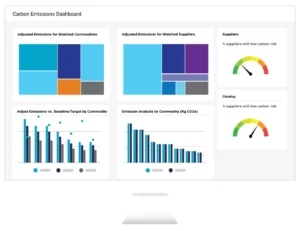Saudi Arabia’s Vision 2030 is an ambitious and transformative blueprint for the future. Aimed at reducing the country’s dependency on oil and creating a diversified, sustainable economy, Vision 2030 is paving the way for transformative progress across multiple sectors. The program emphasizes local sourcing, digital innovation, sustainability, and modernization—positioning procurement as a strategic driver in the achievement of these objectives.
As organizations adapt to this new landscape, procurement leaders are uniquely positioned to drive strategic value and long-term impact. This article outlines six key actions procurement teams must take to align with Vision 2030 and contribute to its success.
Key takeaways:
- Procurement plays a pivotal role in advancing Vision 2030 by focussing on local sourcing, innovation, and economic resilience.
- Adapting to regulatory reforms and investing in digital tools are essential for compliance and operational efficiency.
- Building strong relationships with local suppliers and upskilling teams will be critical for long-term competitiveness and sustainability.
6 Steps to make Vision 2030 a Success
At the heart of this strategy lies a renewed focus on modernizing procurement practices to support national priorities such as local content, digitalization, and sustainability.
Here are the top six actions every organization should take now to stay ahead:
1. Embrace Local Content Initiatives
As part of a broader economic and social strategy, the government introduced the local content policy as a cornerstone of Vision 2030, mandating the integration of Saudi assets, labor, technology, and locally sourced goods and services throughout the production value chain.
For procurement professionals, this means prioritizing the engagement of local suppliers. This approach not only contributes to national economic growth by supporting small and medium-sized Saudi enterprises (SMEs) but also cultivates long-term, strategic partnerships with local suppliers that will be critical to future success.
Actionable Step: Begin by assessing your supply chain to identify opportunities to source more goods and services locally. This will not only strengthen alignment with Vision 2030’s objectives but also promote innovation and deliver long-term cost efficiencies.
2. Adapt to New Procurement Regulations
Vision 2030 introduces new procurement laws and regulations, such as the Government Tenders and Procurement Law (GTPL). These regulations aim to ensure a transparent and efficient public procurement system, with equal opportunities for all bidders. As these reforms unfold, understanding the nuances of these regulations and aligning your procurement strategies accordingly will be critical for compliance and competitiveness.
Actionable Step: Stay informed about the latest updates in procurement laws and regulations and educate your team on the compliance requirements. Seek legal advice when needed to ensure your procurement practices meet government standards.
3. Invest in Digital Procurement Solutions
Digital transformation is at the heart of Saudi Arabia’s Vision 2030. The procurement sector is no exception. With the rise of smart technologies, artificial intelligence (AI), and data analytics, digital procurement solutions will significantly improve procurement efficiency and decision-making.
Adopting these technologies will not only streamline operations but will also enable procurement professionals to leverage data insights to drive efficiencies and reduce costs.
Actionable Step: Invest in e-procurement platforms, automated tools, and AI-driven analytics solutions that can help improve visibility, traceability, and decision-making in your procurement processes. This will position your organization as a forward-thinking partner in the new economy.
Download our Procurement Platform Datasheet
4. Focus on Sustainability and Innovation
As part of Vision 2030, Saudi Arabia aims to build a more sustainable future. Procurement plays a crucial role in this transition by sourcing goods and services that meet sustainability and environmental standards.
Actionable Step: Develop a procurement strategy that prioritizes responsible sourcing and seeks innovative solutions in products and services.
Focus on building a supply chain that can adapt to evolving sustainability standards, which is critical for both regulatory compliance and corporate social responsibility.
Discover how Sustainability is Reshaping Procurement in the Middle East.

Image: Ivalua’s Environmental Impact Center helps businesses reduce the environmental impact of their spend and drive sustainable supply chains.
5. Enhance Supplier Relationship Management
When considering the ambitions of Vision 2030, the importance of supplier relationship management (SRM) becomes even more critical.
As Saudi Arabia focuses on building a resilient economy, procurement professionals must build strong, transparent, and long-term relationships with suppliers. These relationships help foster trust, reliability, and collaboration— essential in a rapidly changing business landscape.
Read our Ultimate Guide to Supplier Management: Strategies & Best Practices for 2025
Actionable Step: Invest in supplier management tools and resources to improve communication, engagement, and performance monitoring with suppliers. Regularly assess supplier performance, provide feedback, and work together to enhance supply chain efficiency. A collaborative approach will make both your organization and suppliers more resilient to market fluctuations.
Download your Supplier Risk and Performance Management Checklist
6. Develop a Skilled Workforce
To thrive under the new Vision 2030 framework, procurement professionals need to be equipped with the right skills. A future-ready workforce combines expertise in digital procurement, regulatory compliance, sustainability, and innovation—ensuring alignment with national priorities and organizational goals.
Therefore, investing in training and development will be vital in keeping pace with the evolving procurement landscape.
Actionable Step: Prioritize training for your procurement team, focusing on areas like digital procurement tools, sustainability practices, and procurement regulations. Partner with educational institutions and industry experts to ensure that your team is continuously developing the skills necessary to succeed.
Conclusion
Saudi Arabia’s Vision 2030 is a transformative plan that will reshape the Kingdom’s economy and the way businesses operate. As procurement professionals, your role will be crucial in driving this transformation.
By embracing local content initiatives, adapting to new regulations, leveraging digital technologies, focusing on sustainability, enhancing supplier relationships, and developing your workforce, you will be positioned to play a leading role in achieving the ambitious goals of Vision 2030.
Now is the time to take action and ensure your procurement processes are ready for the future. The opportunities are significant, and with the right strategies in place, your organization can play a meaningful role in this transformative national journey.




